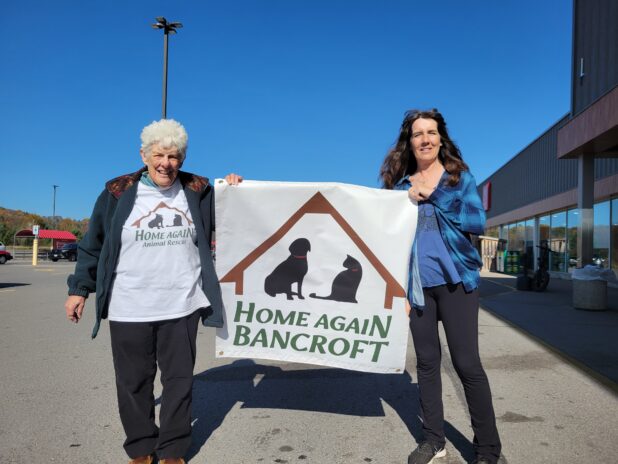Headline News
Home Again giving back to community
October 23, 2024

By Bill Kilpatrick
Christine Walker, the president of the board for Home Again, the local volunteer agency that rescues and rehomes cats and dogs, sat down with Bancroft This Week to talk about their raffle fundraiser, why it’s needed, and all of the ins and outs about how Home Again functions.
Walker, and her board have been talking about doing a raffle for many years, but due to time constraints, it has not happened, until now. “This is the first big raffle that we’ve done and we’re hoping to be able to do it annually,” explained Walker. Walker said that this raffle is a little different than many of the raffles that are held in this area. For Walker and the volunteers at Home Again this is a chance to give back to the community that has supported them through the years. “The reason it’s called the give back raffle is because, being in a small community, we have had to rely heavily on our small business because we don’t have large corporate sponsors,” said Walker, adding that, “our area has been absolutely outstanding … not only businesses but individuals as well, who have helped ensure that Home Again continues to exist. This is an opportunity for Home Again to go out and purchase gift certificates from these businesses [that have supported Home Again], … and it’s giving back to the community by offering up some fantastic prizes for the community.”
Only 5,000 tickets were printed and tickets cost $10 a piece for a chance to win one of four prizes that consist of a $5,000 travel voucher from Nexion Travel Group Canada, a $2,500 gift certificate for local businesses, and two monetary prizes of $1,500 cash and $1,000 cash. “This is a win-win for everyone,” said Walker.
Walker explained that the COVID-19 crisis, along with rising housing costs, inflation, and even climate change has massively impacted the amount of pets that have had to be rescued, along with the amount of medical care required to get them healthy for adoption. During the conversation Walker pointed out that many people think that the majority of pets that Home Again rescues are fairly healthy and only require their inoculations and maybe a flea treatment.
Not so, says Walker who pointed out that 80 per cent of the dogs that Home Again rescues from the dog pound need care beyond their basic inoculations. This includes deworming, parasite control, treatment for mange, and because of the warming climate they are increasingly having to deal with heartworm and lime disease and the complications from those diseases.
Walker and her team of volunteers have had to deal with many different injuries such as broken bones and porcupined dogs as well. Recently they had a $13,000 dog with multiple injuries that was able to be saved, but they also had an abandoned dog that was porcupined so bad that it could not eat for weeks and was so emaciated when it came to Home Again it had to be euthanized.
Walker explained that getting the animals ready for adoption is often the most challenging part of rescuing animals both from an emotional and a financial aspect. “If they show up, we cannot in good conscience rehouse them until they are healthy,” said Walker who added that, “Adoption fees only cover about half of the overall cost. So, if the money’s not there the animal’s not getting care.”
The economic problems that have arisen post-pandemic have resulted in an influx of pets to Home Again. Many people bought pets during lock-down, but then were forced or chose to give them up when the pandemic ended. People who have been displaced by landlords, or lost their homes or rental units due to price increases often have pets that are displaced as well and with the stresses and strains from inflation some people, who want nothing but the best for their pets, cannot afford to keep them anymore and are forced to give them up. She also spoke about retirees who have to give their pets up when they can no longer care for themselves and have to enter a long-term care home. “It’s tragic for people to lose their companions,” said Walker who further pointed out that “the pets are often able to adapt better to that change than the people.”
Compounding the problem for Home Again is the number of other animal rescues that have had to close their doors leaving multiple animals without any where to go. “Just in the last month five other animal rescues have gone under,” said Walker adding that “another rescue is in the process of closing and we are going to take a dog from them.” One of the other volunteers Paula Tripp, said that they are getting requests to take animals from as far away as Brampton. With more and more rescues closing it means that more and more animals have no where to go and are going to end up on the streets and in the wild because the few rescues that are still active are overwhelmed. As an example, Walker pointed too three wild dogs who were recently rescued from Quarry Road.
While finances tend to be the predominant reason that the rescues are closing, Walker says that there is another reason and it’s one that is not often discussed: the mental health of the volunteers. “It’s very emotional,” stated Walker, “You are dealing with multiple emails everyday of people’s stories and their distress and their need to rehome their animals.” Walker pointed out that in one day she had to respond to 43 different communications, “There’s truly not enough hours in the day,” she said, “and I feel awful not being the support person that I’m supposed to be for people.” Walker made it clear that she was not complaining though, she loves volunteering for Home Again, but she does want people to understand the reality of what volunteers running an animal rescue must do to make it work.
There are some developments that have eased their financial burden and allowed more of Home Again’s funds to be used for veterinary costs and outreach activities. “We’ve gotten really lucky in the last couple years of finally being able to get food donations. That was a huge problem and a huge bill,” stated Walker. The organization that is assisting them is called the Kibble Project, which is a pet food bank created by Gladys Orozco, partner of Canadian figure skater Elvis Stojko and is based out of Pontypool. While she still has to drive to Madoc to meet the person from the Kibble Project to pick up the food, Walker is more than happy to do so because of the overall cost savings.
When asked what the greatest need for Home Again is, Walker replied “It’s fosters. That’s the main one. We’re always looking for fosters.” Walker also pointed out that there is need for coordinators to help support the foster families. “What we need is people to manage. The more people we have coordinating, then the more fosters you can have and the more animals you can have. Some animals and fosters require more support and you have to be touching base with them and there’s only so many hours in a day.”
Walker wants people to know that 100 per cent of funds donated to Home Again go to caring for the animals and that they are a registered charity able to give receipts for donations. The Give Back Raffle runs until the end of December and the draw will be held on Jan. 7. Tickets can be purchased at participating business throughout Bancroft who display the Give Back Raffle sign. To find out more information about volunteer opportunities with Home Again or to find out where to buy tickets, or for information about adopting a pet call 613-334-8471 or email [email protected].

















